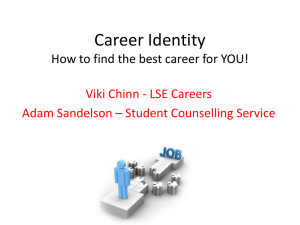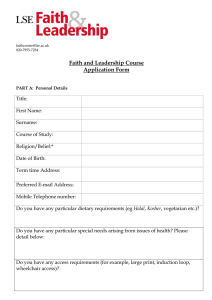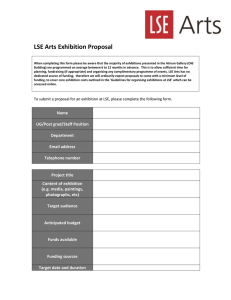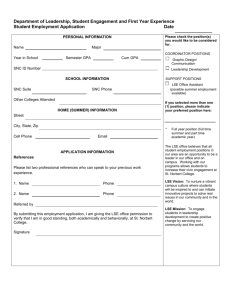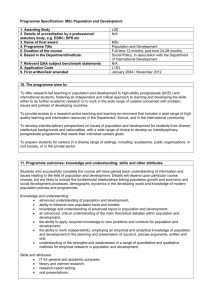Academic Job Applications: How to do them and Keep Going! Adam Sandelson
advertisement
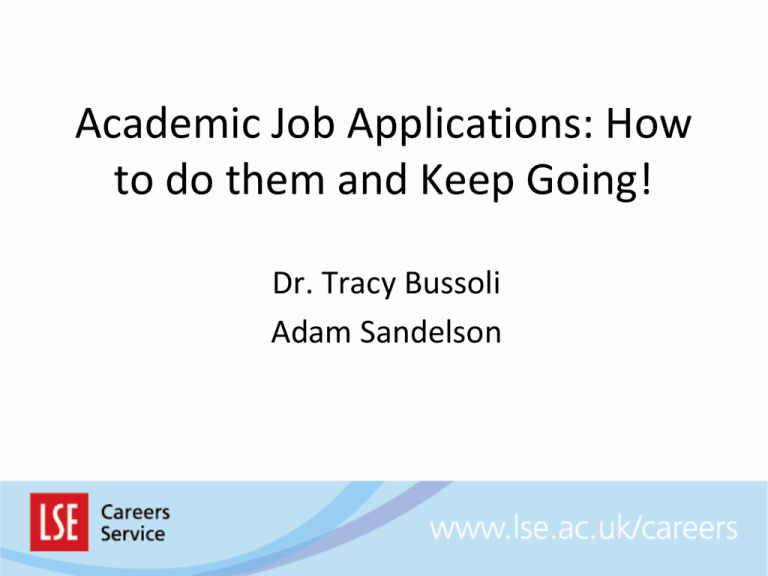
Academic Job Applications: How to do them and Keep Going! Dr. Tracy Bussoli Adam Sandelson Today’s Topics • Do you have the experience and skills for the job? Assessing a job advertisement. • Basic principles for a good application • How to keep going. Some job seeking psychology • You can complete a ‘good’ academic application if you have developed the appropriate experience/skills/connections during your PhD. Then you have something to write about. • In small groups, compile a list of skills and experiences that would be essential for your first academic role after your PhD e.g. a postdoc or a teaching fellowship. What makes you suitable for an academic job? • • • • • Existing or planned publications Teaching experience Teaching qualification Potential as a developing researcher Sense of where you/your expertise are situated within your subject • Transferable experience/knowledge of academic world • Experience of conference/journal management Assessing a job advert • • • • Why does the job appeal to me? What do I offer that they are asking for? What do I not have that they want? What potential is there for me in this job to enhance and develop my career? • What hidden demands and requirements might there be once I am doing the job? Ask yourself… Teaching: • What can I teach on their syllabus? • What new courses for UGs or PGs can I offer? • How do I fit with their culture of teaching my subject? • What are other people teaching in the department, and how will that affect me? • Am I comfortable teaching things I know nothing about? Ask yourself… Research – open agenda: • How do I fit with their research culture? • What opportunities for collaboration or support are there for me as a new researcher? • Can I add to research groups/create new ones? • How can I contribute to conferences and/or publications or establish new ones? Basic principles of a good application • Always tailor your application materials to each individual job – CV, letter, statements etc. • Always provide evidence of relevant achievements • Look objectively at your application materials – How will they look to someone who doesn’t know you? – What is the first thing the reader will see/learn about you? • Discuss with supervisor, careers adviser, or other person with academic perspective Job Application package Will include some or all of: • CV and/or application form • Cover letter/personal statement • Abstract of PhD thesis • Statement of current and future research, including proposed publications • Statement of teaching philosophy, experience and proposed courses Building a Job Application… The right CV for the job • • • • No ‘correct’ way to structure it ‘To abstract’, or not ‘to abstract’…? Education or work experience first? Group work experience by ‘relevant’ and ‘other’ • For publications, use ‘forthcoming’ or ‘submitted for peer review’ or ‘in preparation’ • Awards, honours, professional bodies But always: • Include title of your thesis, supervisor(s), proposed submission date (and viva date) • Include publications, conferences/seminars, awards • Keep layout of dates and information clear • Don’t give too much info with each entry • Consider the reader’s perspective Examples of Academic CVs… • Have a look at the academic CVs provided (all available on-line). • What do you notice about them? • Comment positives and negatives of each. Principles of a good covering letter • Introductory paragraph – refer to job title, where it was advertised • ‘My shoes’ – establish my credentials: who am I (a PhD at LSE!), why does this job appeal to me, how does it fit with who I am now? • ‘Their shoes’ – seeing myself through the recruiter’s eyes, emphasising key strengths they are looking for • Concluding paragraph - include any unavailable interview dates if appropriate Practicals of a good covering letter Make sure you include: – Evidence of teaching experience – Mention courses from their syllabus you could teach at UG1, UG2/3 and PG – Suggest new courses at UG and PG level you could offer – Summary of past and future research plans, especially proposed publications – Demonstrate understanding of key research issues in your area and research dissemination activities – Mention relevant conference or journal activities For application statements (e.g. LSE), make sure you respond to the person spec. headings in full Covering letters with additional statements • In this case, letter is a shorter introduction to your teaching and research statements • So use the letter to summarise key points from your statements • Summarise and string together to show breadth and depth • Don’t repeat phraseology – boring to read How much should you write? • CV – 2+ pages (models on the CS website) • Letter 1-2 pages – shorter if you have statements • Statements – 2-4 pages • Less can be more! • Leave something for interview How to stand out - Teaching • Describe your existing experience – Courses, class sizes, teaching modes – Training, mentoring – Dissertation supervision • Philosophy – general, subject • Proposed role in their department – Existing courses to teach – New UG/Masters courses – Show you understand their teaching of the subject How to stand out - Research • • • • • • • • • Get published in good refereed journals Use conferences to raise your profile Get experience of funding process Understand issues in HE research culture Understand quality assessment process Know the field beyond your own topic Know where your research will go next Develop a second research interest Try to get publishers interested in your book idea Remember…… • Recent research shows that for PhDs currently working in academia, 3 or 4 years after graduating, the most common way they found out about their job was through their professional, work or educational contacts • Looking at employer’s websites or job adverts came third or fourth (depending on whether they were in research or teaching roles). Networking…. • Conferences: – – – – Go! Volunteer to help with organisation Offer to help edit proceedings Research speakers, know the personalities, say hello! • Research: – Get your own out there – Offer to collaborate – Offer to help with editing of compiled books • Look out for non-academic forums for speaking, listening or writing • Teaching: – Go beyond your dept: other depts, summer schools, other univs Barriers to Networking • Adam to do something on this? Job seeking psychology Issues • • • • • • Transition Pressure – internal and external Envy and Competition Self esteem Family pressure Historic patterns of thinking and relating Dynamics of work, life ... Past relationships Current relationships Getting a job/ relationship with LSE/ course… Underlying dynamics • Trying to please others • Wanting to be the best • Setting yourself impossible targets • The family/ historic context for your success Practical approaches • • • • • Time management skills Set realistic and achievable goals Short term targets, longer term strategies Recognise achievements Talk to others, ask for help and support Getting things done Concentrate on the task, not the outcome Focussing on the task • Break down activities into small manageable tasks • Remember past successes • Recognise you are likely to get a job and have a career! • Be methodical and allow – time for breaks and – space to breathe and think Stress Management Skills • • • • • Regularly switch off - physical activity Self care – sleep, diet, caffeine, alcohol Allow yourself time out without guilt Acknowledge anxiety, don’t deny it! Check if negative thoughts are realistic Thinking errors • Discounting the positive • Over-generalizing – because I couldn’t get a good job in the past it will certainly happen again • All or nothing thinking – Either I’ll get a great job or it will be rubbish and I’ll be a failure! • Emotional Reasoning – If I feel it then it must be true Challenging negative thoughts • Apply ‘Socratic reasoning’ or imagine this being tested in a Court of Law – Identify the negative thought • Eg, I won’t get a job or it will be a rubbish one – Ascertain the evidence For and Against – Ask if you are making a ‘thinking error’ – Propose a more reasonable alternative thought Things to Do Don’t Panic • 62% of Social Science PhDs work in HE 3 years after graduating (Vitae, 2010). • Successful applications are about a good match, not statistics. Do your research • Network and find out as much as possible about relevant academic departments - How did they do in the RAE/REF? - Do they have an internal candidate in mind? - What is behind the job advert? Be flexible and consider alternatives! • Conduct rigorous research into different academic institutions to broaden your chances of success • Consider a ‘less prestigious’ university to develop your teaching and/or research skills • Be willing to relocate • Portfolio career e.g. consultancy work in your chosen field, part-time teaching post, part-time editor for academic publication. Get advice and help • Use the Careers Service staff and information resources • Developing a strategy is essential, as is flexibility and adaptability • Get advice to help you think laterally and broaden your options • If you are struggling to manage the experience, contact the Counselling Service Where to get help LSE Careers Service, 3rd floor, Tower 3 • www.lse.ac.uk/careers, Information Room • Careers Guidance, CV checking, interview coaching LSE Student Counselling Service, G507 (20 Kingsway) • www.lse.ac.uk/collections/studentCounsellingServic e/
